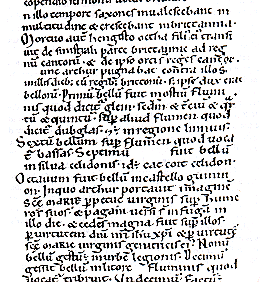
Arthur according to Nennius
 Indeed, a reaction against these Saxon encroachments saw daylight. Aurelius Ambrosius drove Vortigern away. He took refuge in Armorica and confronted victoriously with the Saxons. It is possible that this Aurelius Ambrosius had combatted on the continent in the company of the Franks, and he was perhaps recognised by the name of Riothame, hero of the battle of Déols, in Poitou. But everything is a bit confused during this period. Thus appeared the completely mythical character of Uther Pendragon, the so-called father of Arthur by the grace, and the magic of Merlin the Enchanter. In fact, a study of the manuscript of Historia Brittonum, a latin chronicle written at the beginning of the 10th century by a certain Nennius, shows certain confusion arising from a sentence, mixing Gallic and Latin, concerning 'Arthur mab uter id est horribilis filius'. Indeed, a reaction against these Saxon encroachments saw daylight. Aurelius Ambrosius drove Vortigern away. He took refuge in Armorica and confronted victoriously with the Saxons. It is possible that this Aurelius Ambrosius had combatted on the continent in the company of the Franks, and he was perhaps recognised by the name of Riothame, hero of the battle of Déols, in Poitou. But everything is a bit confused during this period. Thus appeared the completely mythical character of Uther Pendragon, the so-called father of Arthur by the grace, and the magic of Merlin the Enchanter. In fact, a study of the manuscript of Historia Brittonum, a latin chronicle written at the beginning of the 10th century by a certain Nennius, shows certain confusion arising from a sentence, mixing Gallic and Latin, concerning 'Arthur mab uter id est horribilis filius'.
He states:
"Then it was, that the magnanimous Arthur, with all the kings and military force of Britain, fought against the Saxons. And though there were many more noble than himself, yet he was twelve times chosen their commander, and was as often conqueror. The first battle in which he was engaged, was at the mouth of the river Gleni. The second, third, fourth, and fifth, were on another river, by the Britons called Duglas, in the region Linuis. The sixth, on the river Bassas. The seventh in the wood Celidon, which the Britons call Cat Coit Celidon. The eighth was near Gurnion castle, where Arthur bore the image of the Holy Virgin, mother of God, upon his shoulders, and through the power of our Lord Jesus Christ, and the holy Mary, put the Saxons to flight, and pursued them the whole day with great slaughter. The nineth was at te City of Legion, which is called Cair Lion. The tenth was on the banks of the river Trat Treuroit. The eleventh was on the mountain Breguoin, which we call Cat Bregion. The twelfth was a most severe contest, when Arthur penetrated to the hill of Badon. In this engagement, nine hundred and forty fell by his hand alone, no one but the Lord affording him assistance. In all these engagements the Britons were successful. For no strength can avail against the will of the Almighty."
Arthur according to Geoffrey of Monmouth
|











